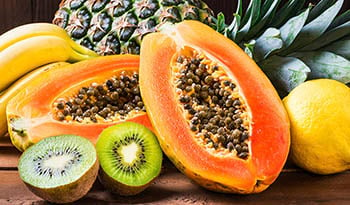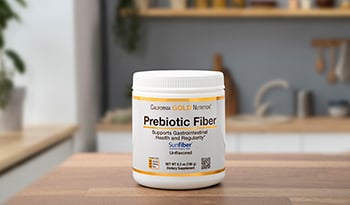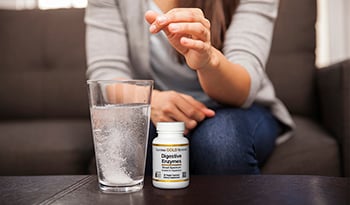20 Natural Approaches to Improving Digestion

We have all felt symptoms of dyspepsia, an uncomfortable feeling in the stomach, at one time or another. It may be associated with indigestion, a sour stomach, acid reflux, or GERD—also known gastroesophageal reflux, which causes an acid-like, burning sensation in the stomach or, perhaps, throat. Dyspepsia can also be caused by gastritis, an inflammation of the stomach. The bacteria Helicobacter pylori (h. pylori) is believed to be the main risk factor for developing stomach ulcers and even stomach cancer, is frequently present in many who suffer from gastritis.
Symptoms of dyspepsia
- Stomach pain or fullness
- Bloating
- Acid sensation in the throat
- Sore throat
- Chest pain
- Acute or chronic cough
- Asthma symptoms due to acid squirting into the lungs
Why do these conditions occur?
Believe it or not, there are several theories. Some argue that the stomach is over producing acid while others suggest the stomach is not producing enough. Excess acid tends to be the most popular explanation, and the solution most doctors reach for when treating patients with stomach problems is anti-acid medication.
On the other hand, some believe that a lack of stomach acid is the culprit, as it causes the lower esophageal sphincter (LES), the muscle which separates the esophagus from the stomach, to relax. When the LES muscle is relaxed, even a small amount of acid can reflux into the esophagus, giving a feeling of too much acid. The LES muscle, it is believed by some, fails to contract and protect the esophagus from acid reflux in the presence of insufficient acid.
Tobacco, fats, chocolate and sugar and certain medications can weaken the muscle. Overeating can also result in food pushing its way from the stomach back into the esophagus up to the throat.
Foods that worsen digestive symptoms
- Processed foods
- Sugary foods
- Simple carbohydrates
- Chocolate
- Alcohol
- Tomato-based foods
- Coffee
- Foods to which one is sensitive to, commonly dairy and grains
Common medications that increase acid reflux
These medications increase acid reflux symptoms by weakening the LES muscle:
- Albuterol: used for asthma
- NSAIDs (Non-steroidal Anti-inflammatory Drugs): ibuprofen (Motrin, Advil), naproxen (Aleve, Naprosyn), diclofenac, indomethacin, and celecoxib (Celebrex). These medications are helpful for pain in the short-term, but they can increase the risk of stomach ulcers and encourages acid reflux.
- Nitroglycerin: used for those with heart disease, angina symptoms
- Blood pressure medications, such as beta blockers (atenolol, metoprolol, carvedilol) and calcium channel blockers (diltiazem, amlodipine, nifedipine)
*Do not stop taking your medications unless instructed to do so by your physician
Lifestyle changes that can improve acid reflux symptoms
- Avoid foods that make your acid reflux worse (these can be different for everyone).
- If you smoke, STOP!
- Sleep on your left side. Sleeping on your right side may worsen symptoms
- Elevated the head of your bed by six to eight inches
- Avoid excessive alcohol. Men should have no more than two drinks per day and women one drink per day, maximum
- Avoid and/or limit the use of anti-inflammatories such as ibuprofen (Advil, Motrin) or naproxen (Aleve) unless absolutely necessary. If you take them, do so with food. Consider acetaminophen (Tylenol) for pain, if needed as acetaminophen will not upset your stomach and does not increase the risk for stomach ulcers. Natural anti-inflammatories, like omega-3 fish oil and turmeric, can be considered and are helpful for many
Common Medications used for Acid Reflux.
Proton Pump Inhibitors (PPIs): omeprazole (Prilosec or Prilosec OTC), esomeprazole (Nexium), rabeprazole (AcipHex), lansoprazole (Prevacid), dexlansoprazole (Dexilant)
Proton Pump Inhibitors (PPIs) are frequently used to combat the discomfort of acid reflux. For most people, they should be taken for the short term.
Reasons to use Acid Reducer Medications:
- Symptomatic acid reflux is not resolved with diet changes. Use for four to eight weeks only unless directed otherwise.
- Stomach ulcers should be treated for six to twelve weeks, so they can heal. A bleeding stomach ulcer can be life-threatening, so the benefits of taking this medication outweigh the risks.
- Those with a precancerous condition in the esophagus, called Barrett’s esophagus, should also be on a PPI medication regularly. This condition is associated with an increased risk of esophageal cancer in one to four percent of those afflicted. PPI medications can help prevent progression to cancer.
- Your doctor has diagnosed a rare condition like Zollinger-Ellison, in which excessive acid is secreted. Those with this condition need to be on the medication lifelong in most cases.
Side effects of acid-reducing medications
Proton Pump Inhibitors, when taken regularly, reduce the body’s ability to break down food protein. Proteins, in the presence of stomach acid, are broken down into amino acids, which are recycled by our bodies to make proteins and brain chemicals, like dopamine and serotonin.
This class of medications reduces absorption of vitamins such as vitamin B12, vitamin C and folate. PPIs also reduce absorption of minerals like iron, calcium and magnesium.
In 2011, the FDA warned that magnesium levels can be dangerously low in people who regularly consume these medications. Low magnesium can cause muscle cramps and heart palpitations. Magnesium is required by our bodies and helps enzymes perform over 350 chemical reactions. Reduced absorption of calcium and magnesium increases risk of osteoporosis. Additionally, a 2016 study showed an increased risk of acute kidney failure in people on these medications while other studies show these medications increase risk of developing dementia.
Those who have been on acid reducers, especially the PPI type, may need to wean off the medication as stopping abruptly may result in worsening acid reflux. To wean, most will take the medicine every other day for two to four weeks until symptoms resolve. Do not stop taking your medication without consulting with your physician.
Primary Supplements which help improve digestion
Betaine HCL
Assuming a person is having digestive issues from insufficient acid products, consumption of betaine HCL (hydrochloric acid) up to three times per day, before a meal, could be beneficial. Those with low acid production, and therefore decreased ability to digest proteins, benefit from betaine HCL according to a study in Molecular Pharmaceutics . A 2014 study showed similar findings. Those with stomach ulcers and Barrett’s esophagus should NOT take this. If the supplement causes discomfort, stop taking it.
A 2017 study gave patients with acid reflux a supplement which contained Betaine HCL and Pepsin. The results showed patients had reduced symptoms of reflux. A 2017 study in Digestive Diseases agreed that this strategy could be beneficial.
Digestive Enzymes
Digestive enzymes: pancreatin, bromelain and papain can also aid the digestive process. They can be taken in supplement form prior to a meal. Suggested dose: Take as directed on the label
Secondary Supplements which help improve digestion
DGL (deglycyrrhizinated licorice)
Studies have shown the benefit of DGL licorice for decades. A 1968 study showed this natural medicine's ability to help heal stomach ulcers and intestinal ulcers. A 1978 study in the British Medical Journal showed it may also be of benefit in the prevention of stomach ulcers.
Vitamin C
Studies show that patients with stomach ulcers have low levels of antioxidants, such as vitamin C, in their stomachs. Low levels of gastric vitamin C is also a risk factor for stomach cancer. Supplementation may be helpful in providing additional digestive support. Suggested dose: 500 to 2,000 mg daily
Turmeric
Turmeric, also known as Curcuma longa and Indian saffron, is a rooted plant of the ginger family, often consumed for its anti-inflammatory, antioxidant, and digestive health properties. Curcumin, a chemical found in turmeric, is believed to provide many health benefits. While many people have used turmeric as a spice to enhance their food for over the past 4,000 years, turmeric has played an important role in natural medicine.
A 2001 study showed turmeric could help heal stomach and intestinal ulcers after four weeks of use. A 2005 study showed that turmeric could help reduce excessive acid release of the stomach by blocking H2 receptors, which is what the prescription acid reducers famotidine and ranitidine do. Lastly, a 2016 study demonstrated that this herb could also help reduce symptoms of acid reflux. Suggested dose: 500 mg once to three times per day
Cayenne
A red pepper which contains the active ingredient capsaicin. Ironically, studies have shown cayenne's therapeutic benefit for digestion. A 2002 study showed red pepper could reduce symptoms of an upset stomach better than a placebo pill. Suggested dose: As directed on the label.
Probiotics
Probiotics include a class of supplements composed of healthy bacteria. The most commonly used strains are Lactobacillus and Bifidobacterium. Restoring bacterial balance and harmony to the digestive system is crucial. A 2016 study confirmed those with dyspepsia have an imbalance of gut bacteria. A 2017 study in the British Medical Journal showed that restoring good bacteria in the stomach and gut using probiotics could be helpful in those with dyspepsia-related symptoms. Prebiotic supplements, which encourage healthy bacteria to grow, may also be considered. Suggested dose: 5 billion to 100 billion units per day.
Other supplements and foods which have shown benefit to the digestive process include essential fatty acids, chamomile tea, apple cider vinegar, and lemon juice.
Herbs that Help Improve Digestion
In Dr. Jonathan Wright’s 2002 book Why Stomach Acid Is Good for You, he provides a list of bitter herbs that have been shown to be helpful and stimulate the digestive juices necessary for healthy digestion. These herbs can be considered if diet changes and use of various supplements listed above are not adequate:
A Healthy Digestive System is Crucial for Health
The breakdown of foods starts in our mouth and further occurs in the stomach, which allows nutrients to be absorbed in our small intestine. Our diet and gut bacteria microbiome strongly influence the efficiency of digestion. When diet and lifestyle changes are not sufficient to help with digestion, medications are frequently relied upon and can be very useful. In addition, supplements and herbs can help restore balance to the digestive system bringing one optimal health. Eat healthy, think healthy, be healthy!
References:
- Yago MAR, Frymoyer AR, Smelick GS, et al. Gastric Re-acidification with Betaine HCl in Healthy Volunteers with Rabeprazole-Induced Hypochlorhydria. Molecular pharmaceutics. 2013;10(11):4032-4037. doi:10.1021/mp4003738.
- Yago MR, Frymoyer A, Benet LZ, et al. The Use of Betaine HCl to Enhance Dasatinib Absorption in Healthy Volunteers with Rabeprazole-Induced Hypochlorhydria. The AAPS Journal. 2014;16(6):1358-1365. doi:10.1208/s12248-014-9673-9.
- Forssmann K, Meier L, Uehleke B, Breuer C, Stange R. A non-interventional, observational study of a fixed combination of pepsin and amino acid hydrochloride in patients with functional dyspepsia. BMC Gastroenterology. 2017;17:123. doi:10.1186/s12876-017-0675-9.
- Digestive Disease. 2017 Oct 5. doi: 10.1159/000481399. [Epub ahead of print]
- Tewari SN, Trembalowicz FC. Some experience with deglycyrrhizinated liquorice in the treatment of gastric and duodenal ulcers with special reference to its spasmolytic effect. Gut. 1968;9(1):48-51.
- Hollanders D, Green G, Woolf IL, et al. Prophylaxis with deglycyrrhizinised liquorice in patients with healed gastric ulcer. British Medical Journal. 1978;1(6106):148.
- J Clin Gastroenterol. 2000 Jun;30(4):381-5.
- Southeast Asian J Trop Med Public Health. 2001 Mar;32(1):208-15.
- Biol Pharm Bull. 2005 Dec;28(12):2220-4.
- Drug Res (Stuttg). 2016 Aug;66(8):444-8. doi: 10.1055/s-0042-109394. Epub 2016 Jun 28.
- Aliment Pharmacol Ther. 2002 Jun;16(6):1075-82.
- Nakae H, Tsuda A, Matsuoka T, Mine T, Koga Y. Gastric microbiota in the functional dyspepsia patients treated with probiotic yogurt. BMJ Open Gastroenterology. 2016;3(1):e000109. doi:10.1136/bmjgast-2016-000109.
- Igarashi M, Nakae H, Matsuoka T, et al. Alteration in the gastric microbiota and its restoration by probiotics in patients with functional dyspepsia. BMJ Open Gastroenterology. 2017;4(1):e000144. doi:10.1136/bmjgast-2017-000144.
DISCLAIMER:This Wellness Hub does not intend to provide diagnosis...


























































































